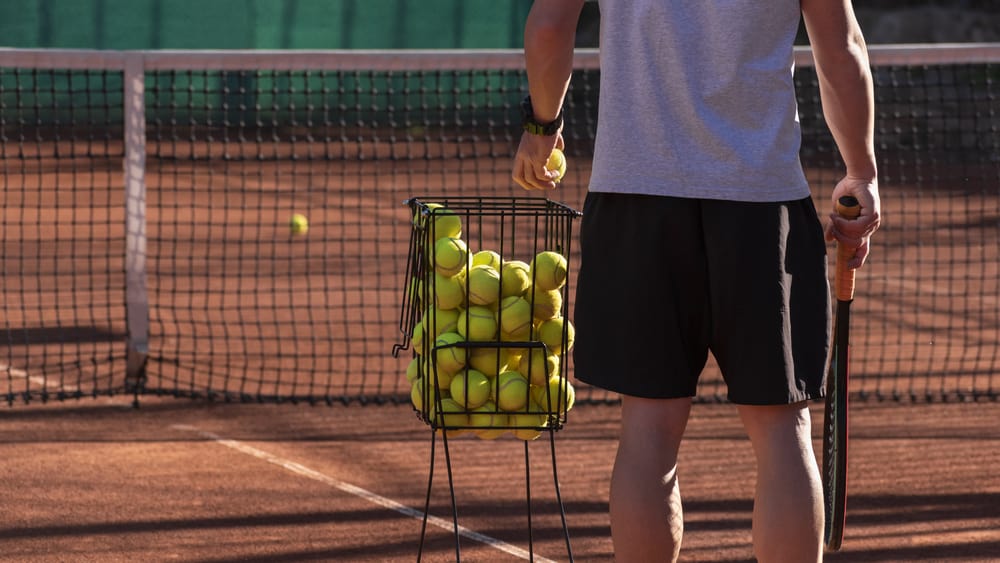New to tennis and wondering how long a can of tennis balls lasts? Well, there are numerous factors involved, but tennis balls do expire. Tennis balls are surprisingly different, so no set rule applies to every brand. Some are specially made for clay or grass, and others are made for concrete.
All tennis balls get to a point where they must be replaced, and some fairly quickly. In the following article, we are going to look at how long they last.
Do unopened tennis balls expire?
Unopened tennis balls do expire. In fact, they usually last around two years when unopened. Most cans are pressurized, but this pressure slowly leaks over time, leaving the balls exposed to the elements.
How to tell when a tennis ball is dead?
The easiest way to tell if a tennis ball is dead is when it does not bounce as high, becomes flat, is not as responsive, and is dull in color. Some tennis players describe dead balls as “heavy,” at which point they are resigned to the trash.
How long are tennis balls good for?
Tennis balls are generally good for anywhere between one to four weeks when used for moderate playing sessions. Tennis balls used during competition will not last anywhere near as long, as heavy play means they will last up to three hours.
Why do tennis balls go bad?
Tennis balls go bad because they lose air over time. The rubber core is designed not to let many gas molecules escape that keep them bouncy, but they manage to find their way out.
Let’s consider some of the other reasons tennis balls go bad.
1. Pressure
Tennis balls lose pressure over time, and it is this loss of pressure that makes them go bad. Without it, they lose their bounce and are dull. Expect most unopened cans of tennis balls to maintain their pressure for up to two years before showing signs of being ‘dead.’
Pressurized tennis balls lose air quickly during play as the contact between the racket, and the ground makes the air escape.
2. Felt Wear
Felt wear is a good indicator of how close tennis balls are to being unusable. The stress the balls go through is reflected in the felt wear, so the more faded and worn they appear, the closer they are to being ‘dead.’
What are “dead” tennis balls?
‘Dead’ tennis balls are balls that have lost their bounce. Balls become ‘dead’ either from overuse or from being unused for an extended period of time. A ‘dead’ tennis ball will be noticeably less bouncy than a fresh ball. However, a new tennis ball can still become ‘dead’ within a session if used during competition or for constant hitting.
Factors that determine the lifespan of a tennis ball
Factors that determine the lifespan of a tennis ball include the tennis ball type, type of playing surface, and level of play.
1. Level of play
A tennis ball will last longer if used recreationally. Hitting a ball hard for an extended period of time during competitive play causes it to wear out faster. Competitive tennis involves more spin and brutal hits, and a pressurized tennis ball will only last a matter of hours under such stress.
2. Tennis ball type: pressurized or unpressurized
The type of tennis balls used will influence how long they last. The two main types are pressurized and unpressurized tennis balls.
Pressurized tennis balls are the most common type and have a high amount of pressure on the core of the ball. This is what gives the ball its bounce. As the tennis ball loses pressure, it loses its bounce.
Unpressurized tennis balls have a thicker rubber core and do not have quite the same level of internal pressure. They are heavier, making them less comfortable to play with. This is why unpressurized balls aren’t used at competitions. Unpressurized tennis balls are often used for lessons as they are more durable.
3. Type of tennis court surface
The type of surface will influence how long it takes for a tennis ball to go bad because some, like asphalt and concrete, are more abrasive and wear the balls down faster. Grass and clay courts are more forgiving and do not wear the ball down so quickly.
How to tell if a tennis ball needs replacing?
The three main ways of telling if a tennis ball needs replacing are as follows:
- Bounce – the easiest way to tell if a ball needs replacing is that it does not bounce as high. Compare it to a fresh ball to see the actual difference. If it drops significantly lower, the ball needs replacing.
- Sound – The sound of a dull tennis ball is hollow and noticeably different from the whack of a fresh ball.
- Squeeze – a new tennis ball will not have a lot of give in it, whereas a dead ball will be easier to put a dent in when squeezing.
FAQ
How long do tennis balls last in a pro match?
A tennis ball will generally last around 1-3 sets in a pro match. High levels of spin are used, and the force of each strike causes the balls to lose pressure sooner.
Can you restore the bounce of expired tennis balls?
You can restore the bounce of expired tennis balls, but only with a specialist valve. These products are generally saved for tennis camps and coaching where balls are in regular use.
How to make tennis balls last longer?
The best way to make tennis balls last longer is to use them more. Using one or two balls will cause them to expire sooner, meaning a lot of dead tennis balls. Otherwise, keep the can of tennis balls unopened for as long as possible to keep them pressurized. This is because tennis balls lose their pressure as soon as they are opened.
Why are tennis balls pressurized?
Tennis balls are pressurized to ensure they retain their pressure long after they are shipped to the store. They have an internal pressure of around 14 psi, and the pans also have the same level of pressure internally. This ensures they retain their pressure up to the day they are opened.
How long can you use tennis balls?
Tennis balls can be used for up to four weeks when playing moderately. Competitive tennis involves higher levels of spin and force used to hit the balls, so expect them to last as little as three hours.
Conclusion
Tennis balls do expire, but there are ways to make them last longer. Be mindful of the surface used and the level of play, and keep an eye on the bounce to ensure you are making the most of your time on the court.
 Written by Mark Sampson
Written by Mark Sampson